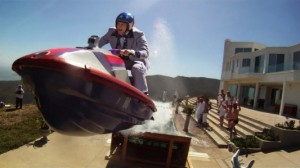

By Noah Forrest Forrest@moviecitynews.com
Jackass 3-D (Dir. Jeff Tremaine)
As much as I pride myself on my film snobbery, I’m an unabashed fan of the Jackass series and films. I used to say to anyone who would question me, “well, it’s stupid fun, but I like it for some reason.” Well, I no longer think of it as just “stupid fun.” Don’t get me wrong, I don’t think the films are shining examples of witticism. However, they are certainly more witty than people give them credit for. The stunts that they pull are so absurd as to be almost brilliant, but what really gets me are the ad-libbed reactions that Johnny Knoxville or Chris Pontius will throw out there after a stunt, like, “oh man, that hurt to do that to you” after Pontius puts a fish hook in Steve-O’s cheek.
The key to any great comedy is to give us likable characters and put them in precarious situations where we care about the outcome. Jackass has perfected this formula. All of the guys in the films are inherently likable because they are 1) self-deprecating and 2) self-harming; we, as human beings, tend to have a soft spot for people who are self-deprecating and for those that will harm themselves for our benefit. And we always care about the outcome of each of these insane stunts and it’s usually either 1) I hope he doesn’t die and/or get maimed or 2) I hope he doesn’t vomit. What the films do that is somewhat revolutionary is take out the whole business about a plot and story. But, the interesting thing is that over the course of the series and the films, we have certainly seen character growth and bonds. And male bonding is really what the series has always been about; just getting together with your best buddies and doing dumb stunts in the hopes of making your pals laugh.
But enough trying to analyze the complexities of Jackass 3-D. I went to the midnight showing with two of my best friends and we – like most people in the theater – had quite a few drinks beforehand (and during). The crowd was wild, which was what I was hoping for when I decided to see the midnight showing. This is truly one of those must-see theater experiences because it’s not the same watching the film at home, without hearing the crowd collectively go, “ohhhhhhhhh.” I don’t necessarily know that the 3-D part of the film was warranted or that they truly take advantage of it outside of a few scenes at the beginning and end, but I will say that if you’re going to see this movie, then you are going to get exactly what you paid for and signed up for.
I will say that I don’t think the film is as strong as the first two installments. Perhaps it’s a result of getting older (both myself and the crew) or perhaps it’s because there’s only so many new ways to put yourself at risk of death and disease, but the film didn’t make me laugh or cringe as much as the first two. However, it’s still ridiculously funny and one of the best times I’ve had in a theater this year. I don’t want to spoil the stunts for you, but I will say that I enjoyed the scene with Super Mighty Glue, the scene with the gorilla in April and Phil Margera’s hotel room, Bam’s “Rocky” re-enactments, the “Helicockter,” the scene where Wee-Man walks into a bar with his little person lady friend, the scene with Knoxville and the bull, Steve-O and Pontius playing “tee ball,” and a whole handful of others. There were a few parts that fell flat, but the film moves so fast that we don’t have time to notice and nothing really made me gag, which is both a plus and a minus. The sweat-suit cocktail, though, was one of the most disgusting things I’ve ever seen and I mean that as the highest compliment.
Anyway, I’m surprised I was able to write 700 words about a film that is really all about the visceral. And my visceral reaction to the movie was: very, very funny.















